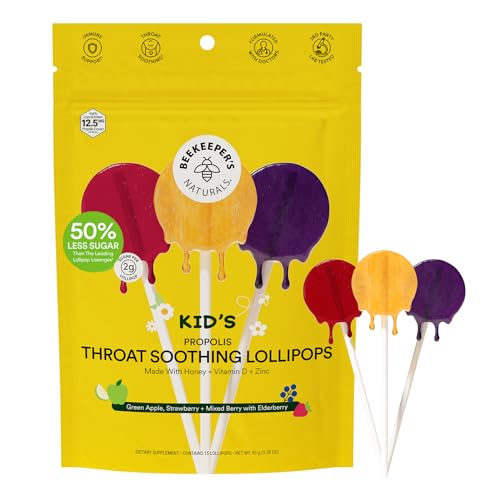
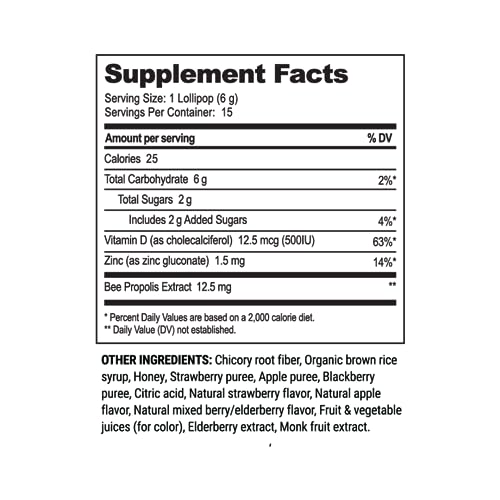
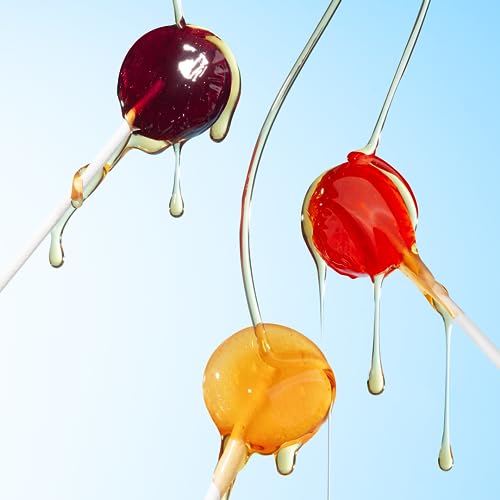
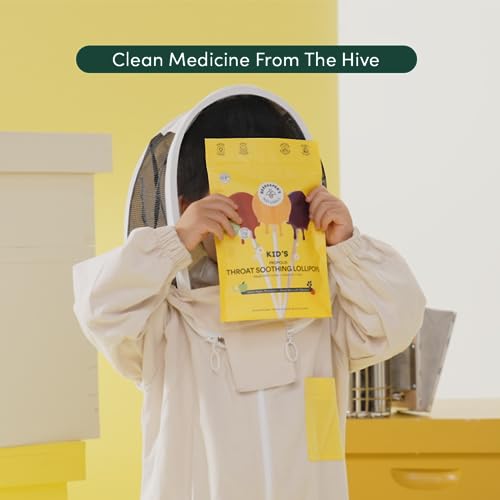

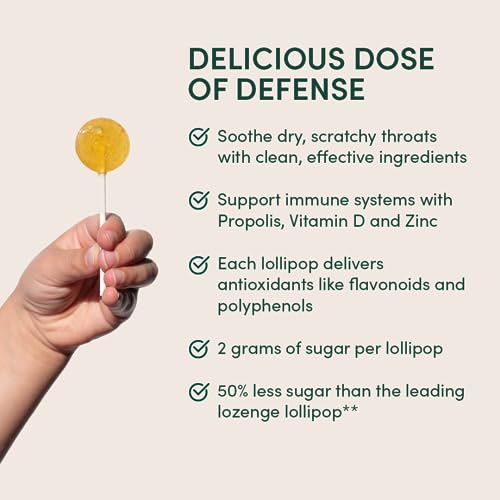
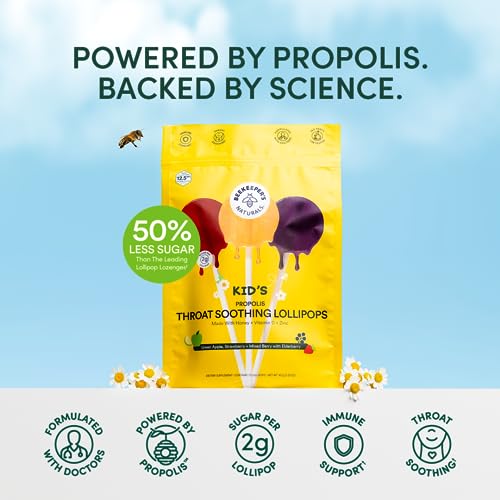
Beekeeper's Naturals Kids Throat Lozenges - Immune Support, Vitamin D & Honey, 15ct


Vitamin D3
High RiskVitamin D3, also known as cholecalciferol, is a fat-soluble vitamin important for calcium metabolism and bone health. It is synthesized in the skin upon exposure to sunlight and is also found in some foods and supplements. Its primary function is to promote the absorption of calcium and phosphorus in the body.
Sustai Insights
Vitamin D3 offers functional benefits such as supporting bone health and immune function. However, excessive intake can lead to toxicity, presenting risks like hypercalcemia. Environmental concerns include its potential for bioaccumulation. Regulatory bodies impose usage restrictions due to these risks, resulting in a high overall risk assessment. Safe usage practices should be observed, and alternatives such as vitamin D2 may be considered.
Zinc
Medium RiskZinc is a trace mineral essential for various biological functions, including immune system support and cellular metabolism. It is commonly used in topical products for its antibacterial properties and is often included in formulations for skin health and wound healing.
Sustai Insights
Zinc offers functional benefits such as promoting skin health and providing antimicrobial effects, and it can be sustainably sourced. However, it poses moderate environmental risks due to potential bioaccumulation. Health risks are generally low, with concerns mainly related to developmental and reproductive toxicity at high exposures. Regulatory bodies have imposed some restrictions on its use, indicating a medium overall risk assessment. Safe usage practices should be followed, and alternatives like magnesium may offer similar benefits with lower risks.
Citric Acid
Medium RiskCitric acid is an alpha hydroxy acid used in personal care products primarily for its role as a pH adjuster and natural preservative. It occurs naturally in citrus fruits and is commonly utilized in various formulations for its chelating properties and mild exfoliation benefits.
Sustai Insights
Citric acid offers functional benefits as an effective preservative and pH stabilizer, contributing to product longevity and stability. It is biodegradable and derived from renewable sources. Health risks are low, with minimal concerns regarding carcinogenicity, allergies, and reproductive toxicity. However, moderate use restrictions exist due to potential irritation at high concentrations. Environmental risks are limited, as citric acid is not known to accumulate in ecosystems. Regulatory agencies have no significant advisories against its use. Overall, it is assessed as a medium-risk ingredient, with safe usage practices recommended and alternatives available.
Fragaria Vesca (Strawberry) Fruit
Low RiskFragaria vesca (strawberry) fruit is a plant material derived from the wild strawberry. It is primarily used in cosmetic formulations for its natural fragrance, color, and potential antioxidant properties. The fruit is known for its appealing scent and is often incorporated into products aimed at enhancing sensory experiences.
Sustai Insights
Fragaria vesca is valued for its functional benefits, including natural fragrance and potential antioxidant effects. It is recognized for its low health risk profile, with minimal concerns regarding carcinogenicity, allergies, or reproductive toxicity. Environmentally, it poses low risks, as it is not known to be a pollutant or bioaccumulative. Regulatory bodies do not impose restrictions on its use, contributing to its overall low risk assessment. For safe application, it is essential to consider individual sensitivities, though it generally represents a low-risk option among cosmetic ingredients.
Honey
Low RiskHoney is a saccharic secretion gathered and stored by honeybees, primarily composed of sugars such as fructose and glucose. It is commonly used in cosmetic products for its humectant properties, helping to retain moisture and improve skin hydration.
Sustai Insights
Honey offers functional benefits such as moisturizing and soothing properties, contributing to skin care formulations. It has a low risk of health concerns, including potential allergenic reactions and endocrine disruption. Environmentally, honey is generally sustainable, being biodegradable and often sourced ethically. Regulatory bodies place low restrictions on its use, but it should be avoided by individuals with bee allergies. Overall, the ingredient presents a low risk profile for consumers.
Propolis
Low RiskPropolis is a resinous substance produced by bees from plant materials, primarily used in cosmetic and medicinal products for its potential antimicrobial properties. It acts as a natural preservative and may contribute to product stability.
Sustai Insights
Propolis offers functional benefits such as antimicrobial properties and potential skin protection. It is sustainably sourced and biodegradable. Health risks are minimal, with low concerns for carcinogenicity, allergies, or reproductive toxicity. Environmentally, it poses low pollution or bioaccumulation risks. Regulatory status shows no current restrictions. Overall, propolis is assessed as low risk, with safe usage practices recommended. Alternatives include other natural preservatives like rosemary extract.
Pyrus Malus (Apple) Fruit
Low RiskPyrus malus (apple) fruit is the fruit of the apple tree, commonly used in cosmetic formulations. It serves various functions, including acting as a moisturizer and providing antioxidant properties due to its natural compounds.
Sustai Insights
Pyrus malus (apple) fruit offers functional benefits such as moisturizing and antioxidant effects, contributing to skin health. It is sustainably sourced and poses low health risks, with minimal concerns regarding carcinogenicity, allergenic potential, or developmental toxicity. Environmental impacts are also low. Regulatory bodies do not impose significant restrictions on its use, classifying it as low risk overall. Safe usage practices include adhering to recommended concentrations in product formulations. Alternatives like other fruit extracts may provide similar benefits with comparable safety profiles.
Vitamin D3
High RiskVitamin D3, also known as cholecalciferol, is a fat-soluble vitamin important for calcium metabolism and bone health. It is synthesized in the skin upon exposure to sunlight and is also found in some foods and supplements. Its primary function is to promote the absorption of calcium and phosphorus in the body.
Sustai Insights
Vitamin D3 offers functional benefits such as supporting bone health and immune function. However, excessive intake can lead to toxicity, presenting risks like hypercalcemia. Environmental concerns include its potential for bioaccumulation. Regulatory bodies impose usage restrictions due to these risks, resulting in a high overall risk assessment. Safe usage practices should be observed, and alternatives such as vitamin D2 may be considered.
Fragaria Vesca (Strawberry) Fruit
Low RiskFragaria vesca (strawberry) fruit is a plant material derived from the wild strawberry. It is primarily used in cosmetic formulations for its natural fragrance, color, and potential antioxidant properties. The fruit is known for its appealing scent and is often incorporated into products aimed at enhancing sensory experiences.
Sustai Insights
Fragaria vesca is valued for its functional benefits, including natural fragrance and potential antioxidant effects. It is recognized for its low health risk profile, with minimal concerns regarding carcinogenicity, allergies, or reproductive toxicity. Environmentally, it poses low risks, as it is not known to be a pollutant or bioaccumulative. Regulatory bodies do not impose restrictions on its use, contributing to its overall low risk assessment. For safe application, it is essential to consider individual sensitivities, though it generally represents a low-risk option among cosmetic ingredients.
Zinc
Medium RiskZinc is a trace mineral essential for various biological functions, including immune system support and cellular metabolism. It is commonly used in topical products for its antibacterial properties and is often included in formulations for skin health and wound healing.
Sustai Insights
Zinc offers functional benefits such as promoting skin health and providing antimicrobial effects, and it can be sustainably sourced. However, it poses moderate environmental risks due to potential bioaccumulation. Health risks are generally low, with concerns mainly related to developmental and reproductive toxicity at high exposures. Regulatory bodies have imposed some restrictions on its use, indicating a medium overall risk assessment. Safe usage practices should be followed, and alternatives like magnesium may offer similar benefits with lower risks.
Citric Acid
Medium RiskCitric acid is an alpha hydroxy acid used in personal care products primarily for its role as a pH adjuster and natural preservative. It occurs naturally in citrus fruits and is commonly utilized in various formulations for its chelating properties and mild exfoliation benefits.
Sustai Insights
Citric acid offers functional benefits as an effective preservative and pH stabilizer, contributing to product longevity and stability. It is biodegradable and derived from renewable sources. Health risks are low, with minimal concerns regarding carcinogenicity, allergies, and reproductive toxicity. However, moderate use restrictions exist due to potential irritation at high concentrations. Environmental risks are limited, as citric acid is not known to accumulate in ecosystems. Regulatory agencies have no significant advisories against its use. Overall, it is assessed as a medium-risk ingredient, with safe usage practices recommended and alternatives available.
Honey
Low RiskHoney is a saccharic secretion gathered and stored by honeybees, primarily composed of sugars such as fructose and glucose. It is commonly used in cosmetic products for its humectant properties, helping to retain moisture and improve skin hydration.
Sustai Insights
Honey offers functional benefits such as moisturizing and soothing properties, contributing to skin care formulations. It has a low risk of health concerns, including potential allergenic reactions and endocrine disruption. Environmentally, honey is generally sustainable, being biodegradable and often sourced ethically. Regulatory bodies place low restrictions on its use, but it should be avoided by individuals with bee allergies. Overall, the ingredient presents a low risk profile for consumers.
Propolis
Low RiskPropolis is a resinous substance produced by bees from plant materials, primarily used in cosmetic and medicinal products for its potential antimicrobial properties. It acts as a natural preservative and may contribute to product stability.
Sustai Insights
Propolis offers functional benefits such as antimicrobial properties and potential skin protection. It is sustainably sourced and biodegradable. Health risks are minimal, with low concerns for carcinogenicity, allergies, or reproductive toxicity. Environmentally, it poses low pollution or bioaccumulation risks. Regulatory status shows no current restrictions. Overall, propolis is assessed as low risk, with safe usage practices recommended. Alternatives include other natural preservatives like rosemary extract.
Pyrus Malus (Apple) Fruit
Low RiskPyrus malus (apple) fruit is the fruit of the apple tree, commonly used in cosmetic formulations. It serves various functions, including acting as a moisturizer and providing antioxidant properties due to its natural compounds.
Sustai Insights
Pyrus malus (apple) fruit offers functional benefits such as moisturizing and antioxidant effects, contributing to skin health. It is sustainably sourced and poses low health risks, with minimal concerns regarding carcinogenicity, allergenic potential, or developmental toxicity. Environmental impacts are also low. Regulatory bodies do not impose significant restrictions on its use, classifying it as low risk overall. Safe usage practices include adhering to recommended concentrations in product formulations. Alternatives like other fruit extracts may provide similar benefits with comparable safety profiles.
Discover Beekeeper's Naturals Kids Throat Soothing Lollipops, the fun and effective way to support your child's immune health. Formulated by doctors, these tasty lollipops combine Propolis, Vitamin D, and Zinc with Wildflower Honey, making them a delicious remedy your kids will love.
- Immune Boosting Benefits: Enriched with Vitamin D and Zinc, these lollipops provide essential support for your child's immune system, helping them stay healthy throughout the year.
- Lower Sugar Content: With only 2g of sugar per serving, they contain 50% less sugar than conventional lozenges, making them a guilt-free choice for throat relief.
- Flavor Variety: Available in delightful flavors like strawberry, green apple, and mixed berry, these lollipops are sure to please even the pickiest of eaters.
- Convenient Relief: Perfect for on-the-go, keep these lollipops handy to soothe scratchy throats anytime, anywhere.
- Natural Ingredients: Crafted with clean and wholesome ingredients, these lollipops offer a safe alternative to traditional throat remedies, making them ideal for health-conscious families.
Subscribe & Save with Sustai
- Best Price Guarantee: Always enjoy the lowest prices on sustainable home essentials.
- No Surprises: We’ll notify you before shipping. No hidden fees, ever.
- You’re in Charge: Change, pause, or cancel your subscription anytime with ease.
- Eco-Friendly Deliveries: Our grouped shipments mean less packaging and lower emissions.
Join us on a sustainable journey. Special offers for a limited time! Prices and promotions may change.
Recommended Products
Discover Beekeeper's Naturals Kids Throat Soothing Lollipops, the fun and effective way to support your child's immune health. Formulated by doctors, these tasty lollipops combine Propolis, Vitamin D, and Zinc with Wildflower Honey, making them a delicious remedy your kids will love.
- Immune Boosting Benefits: Enriched with Vitamin D and Zinc, these lollipops provide essential support for your child's immune system, helping them stay healthy throughout the year.
- Lower Sugar Content: With only 2g of sugar per serving, they contain 50% less sugar than conventional lozenges, making them a guilt-free choice for throat relief.
- Flavor Variety: Available in delightful flavors like strawberry, green apple, and mixed berry, these lollipops are sure to please even the pickiest of eaters.
- Convenient Relief: Perfect for on-the-go, keep these lollipops handy to soothe scratchy throats anytime, anywhere.
- Natural Ingredients: Crafted with clean and wholesome ingredients, these lollipops offer a safe alternative to traditional throat remedies, making them ideal for health-conscious families.

You can have at most 2 Sustainable Steals products in your cart
Customer Reviews
Customers’ View
Customers appreciate the throat-soothing effectiveness and natural formulation of Beekeeper's Naturals Kids' Throat-Soothing Lollipops. Many highlight the pleasant taste, noting they are not overly sweet and contain only 2g of sugar, making them a healthier alternative for children. Reviewers commend the immune-boosting ingredients like Vitamin D and elderberry, which align with health-conscious values. However, some customers expressed concerns about the product's meltability, with reports of lollipops arriving sticky and deformed, impacting their overall experience. Despite these issues, the lollipops are generally well-received for their quality and kid-friendly appeal, reinforcing their value in supporting children's health during cold and flu season.
AI-generated from the text of customer reviewsThis product has no reviews yet.




